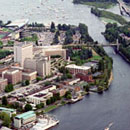|

Home Page
Calendar of Events
CHDD Outlook Newsletter
Directions & Transportation
Director's Message
Contact Us
UCEDD Details |
                

Center on Human Development and Disability
Overview of the University Center for Excellence in Developmental
Disabilities
Organization
| Programs | Core Functions
|Detailed Information on UCEDD
UCEDD
The Center on Human Development and Disability (CHDD) is one of the nation's largest and most comprehensive interdisciplinary service, research, and training centers focusing on children and adults at risk for or who have established developmental disabilities. Each year, more than 600 University of Washington faculty and staff members as well as numerous doctoral and postdoctoral students make important contributions to the lives of people with developmental disabilities and their families. This is accomplished through a comprehensive array of research, clinical services, training, community outreach, and dissemination activities. In this context, we create an integrated, interdisciplinary program involving the following academic disciplines: audiology, architecture, dentistry, developmental pediatrics, epidemiology, genetic counseling, law, medical genetics, neurology, nursing, nutrition, occupational therapy, physical therapy, psychiatry, public health, psychology, social work, speech-language pathology, and special education.
The University Center for Excellence in Developmental Disabilities (UCEDD) is a part of the Center on Human Development and Disability and has been in existence since 1963. Our UCEDD is organized within 8 administrative programs.
Organization
Each of the 8 programs has identified priorities in recognition of community needs and carries out a number of projects to meet the program’s goals and objectives within the framework of the broader UCEDD agenda.
These are: (1) Adults and Elders,
(2) Autism Center,
(3) Center for Technology and Disability Studies,
(4) Clinical Training Unit,
(5) Community Disability Policy Initiative,
(6) Consortium on Early Childhood Intervention,
(7) Haring Center (EEU), and
(8) Genetics Program. Each program
focuses on goals, objectives, and activities specifically relevant
to its priorities established in recognition of community needs.
However, there is considerable integration among the 8 programs
thereby creating a unified UCEDD.
Programs
Each of the 8 programs is responsible
for carrying out a number of projects to meet its goals and objectives.
These projects are listed under each program.
Core Functions
Core functions include: (1) Professional Training (2) Technical Assistance and Outreach Training (3) Clinical Services (CHDD clinics, community-based clinics), (4) Research and Evaluation and (5) Information Development and Dissemination. Each project can have multiple core functions although most tend to have only one. These core functions are consistent with the Administration on Intellectural and Developmental Disabilities organizational framework (our core federal funding agency for the UCEDD).
Descriptions of these five core functions follow:
Professional Training: Providing interdisciplinary clinical and didactic training to students (primarily graduate and post-graduate) enrolled in an academic program at the UW and other academic institutions. Training experiences prepare students to provide interdisciplinary and comprehensive services and supports to individuals with developmental disabilities in the community, and often serve to meet the requirements for their degree program.
Technical Assistance and Outreach Training: Technical assistance is direct problemsolving services provided by UCEDD faculty and staff to assist individuals, programs, and agencies in improving their services, management, and/or policies. Outreach training is increasing awareness and building capacity of paraprofessionals and professionals through training opportunities (e.g., workshops, continuing education programs) so they are better able to serve individuals with developmental disabilities in the community.
Clinical Services: Includes a variety of clinical services provided to individuals with disabilities or those at risk for disabilities and their families.
CHDD Clinics: CHDD operates a range of on-site clinical service programs that serve individuals, primarily children, with or at risk for developmental, learning, and behavioral problems.
Community-Based Clinics: UCEDD faculty and staff extend their clinical services by serving clients at community-based clinics and programs.
Research and Evaluation: Includes applied research and evaluation, as well as the analysis of public policy in areas relevant to the field of developmental disabilities.
Information Development and Dissemination: Involves the development or organization, and then dissemination of information including professional publications and products for increasing public awareness, building capacity, and expanding research and practice knowledge within the field of developmental disabilities.
|